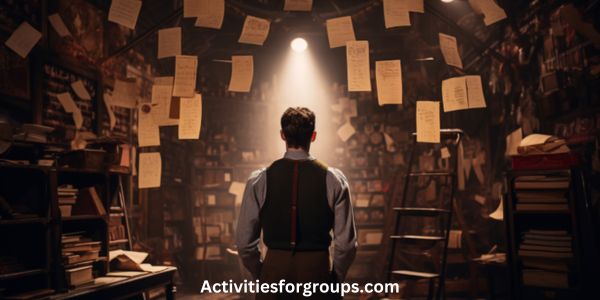Do you want to learn how to organize group theater workshops for beginners? It’s easier than you think!
With the right venue, agenda, rules, supplies, and teaching style, you can create an enjoyable and educational workshop.

Learn how to make it all come together in this article.
Choosing the Right Venue
When choosing a venue, it’s important to consider the size of the group, the activities you’ll be doing, and the level of expertise of your participants. Enacting scenes and working with group dynamics require a space large enough for everyone to move around. Look for a venue with plenty of room, natural light, and comfortable seating.
The acoustics of the space should also be taken into consideration. Check if the workshop space has areas for group discussion, and a stage or area marked off for enacting scenes. You’ll also want to consider the amenities and available equipment. Make sure it’s equipped with a projector and microphone if you plan to give presentations, and that it has a sound system if you plan to use music.
Finally, factor in the cost of renting the space. If the venue isn’t available for free or subsidized, consider other options like a community center or school. Even if these sites aren’t as glamorous, they may still offer suitable facilities for theater workshops.
When organizing a group theater workshop, selecting the right venue is key to creating a safe and inspiring environment. Take the time to research different options, and choose a venue that meets all of your group’s needs.
Setting the Workshop Agenda

Creating an agenda for your workshop and planning activities accordingly will help ensure a successful event. Planning a workshop agenda should be an organized and thoughtful process that allows for a balance of structure and creativity.
To create an effective agenda, it’s important to consider the following:
- Developing Trust:
- Introduce yourself to the group and share your philosophy.
- Establish group expectations and rules.
- Create an open and comfortable environment.
- Creating Structure:
- Layout the workshop schedule and activities.
- Establish a timeline and objectives.
- Provide clear instructions and expectations.
- Encouraging Creativity:
- Give participants the freedom to explore.
- Encourage out-of-the-box ideas.
- Foster collaboration and discussion.
Establishing Workshop Rules
Once you have established trust with the group, you should then set clear rules for the workshop. These should be discussed and agreed upon before the workshop begins in order to ensure everyone is on the same page. Building trust is essential for a successful workshop, as it will create an environment that fosters creativity and collaboration.
When establishing workshop rules, it’s important to remember that there’s no one-size-fits-all approach. Depending on the group, the facilitator may want to tailor the rules to suit the participants. However, there are a few basic rules that should be included in every workshop, such as respect for each other’s opinions, no criticism or judgment, and respect for the facilitator’s instructions.
In addition to these basic rules, it’s a good idea to set some ground rules which will help to ensure that the workshop runs smoothly. These might include things like no phones or technology, no talking when someone else is speaking, and no ideas which are deemed inappropriate or offensive.
Equipment and Supplies Needed
You’ll need some equipment and supplies to get your group theater workshop off the ground. Depending on the type of activities you plan to do, you’ll need to consider what materials are necessary to make the experience enjoyable for your participants. Generally speaking, you should consider the following:
- Audiovisual Equipment:
- Digital projector
- Sound system
- Computer
- Craft Supplies:
- Poster board
- Markers
- Glue
- Role Playing Games and Improvisation Exercises:
- Costumes
- Props
- Scripts
- Storytelling props
When selecting the materials to use for your workshop, try to pick items that are age-appropriate and will make the experience fun and engaging for the participants. If possible, it’s a good idea to have several copies of any scripts or props so that everyone can have a turn.
Managing and Teaching the Workshop

Once you’ve gathered the necessary equipment and supplies, it’s time to start managing and teaching the workshop. Before you dive in, it’s important to set some ground rules with the group. Be sure to emphasize the importance of being respectful and open-minded to everyone’s ideas. Once everyone agrees, break the ice with some warm-up activities. This could include some team-building exercises, improvisation games, or even a few fun group exercises. This will help foster collaboration and create an atmosphere of comfort and support.
As you teach the workshop, it’s important to stay organized. Create a plan with the group and assign tasks to each member. This could include writing scripts, designing sets, or creating props. Make sure to be patient and encouraging as everyone learns the material. If someone is having difficulty understanding something, be sure to provide additional help.
Lastly, it’s important to be flexible and creative to make the workshop a success. Encourage members to problem solve and come up with solutions that work best for the group. This will help foster their creative thinking and allow them to come up with unique ideas. With the right preparation and guidance, your group theater workshop will be a success.
Frequently Asked Questions [FAQs]
What Are the Qualifications Required to Lead a Theater Workshop?
To lead a theater workshop, you need experience in theater and training in workshop safety. Additionally, you should have knowledge of the target audience, a plan for the workshop, and the ability to manage the group.
How Much Should I Charge for the Workshop?
When determining what to charge for a theater workshop, consider factors such as facility costs and group size. Based on these factors, you can set a fair price for your services.
What Is the Best Way to Market the Workshop?
To market your workshop, try using networking strategies and leveraging social media. Connect with potential participants through trusted networks and promote the event with engaging posts.
Are There Any Legal Considerations I Should Take Into Account?
You should consider any license and insurance requirements necessary for your workshop. Make sure these are in place before you begin to market it.
What Resources Are Available to Help Me Plan the Workshop?
When planning a workshop, creating a budget and finding sponsors are key. Look into local theater organizations for help; they can provide resources to help you plan and budget. Online tutorials can also help you get started.
Conclusion
Organizing group theater workshops can be a daunting task, but with the right guidance and preparation, it can be a rewarding experience.
By taking the time to choose the right venue, set an appropriate agenda, establish clear rules, and have the necessary equipment and supplies, you can make sure your workshop is a success.
Don’t forget to manage and teach the workshop thoughtfully, and you’ll be sure to have a productive and enjoyable experience.




Leave a Reply